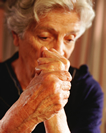Speech & Communication

 Strokes can hurt parts of the brain and muscles used for listening, speaking and understanding words.
Strokes can hurt parts of the brain and muscles used for listening, speaking and understanding words.
What Do You Need to Know?
Three common problems are aphasia, dysarthria and apraxia. Your loved one may have one or more of these problems at the same time.
Aphasia
Aphasia is a problem with using and/or understanding language. Aphasia is caused by damage to part of the brain. People with aphasia have a hard time finding the “right” words. They may not be able to say the words they want or the words come out wrong. People with aphasia may have problems understanding words said by others. They may not understand what someone is saying in conversation or on television. Bilingual aphasia affects people who speak two languages and have trouble with both after stroke.
Dysarthria
Dysarthria results from damage to the part of the brain that produces speech. As a result, speech may sound slurred. People with dysarthria may have problems saying sounds correctly.
Apraxia
Apraxia is a problem finding the “right” sounds to use when speaking. The speech may sound “flat.” The person’s tone may not change. He or she may only say one syllable at a time. Aphasia and apraxia of speech almost always occur at the same time.
Why Is It Important to Get Help?
People who have trouble talking and understanding what others say may become depressed. Stroke survivors with communication problems are often angry and get frustrated easily. Sometimes these problems last for just a short time. Most stroke survivors take a long time to regain their speech and language. You and your loved one will need to learn new ways to communicate with each other. The good news is that treatments and tips can improve communication.
What Treatments Should You Discuss with Your Healthcare Team?
Talk to your loved one’s healthcare provider right away about treatments and referrals. Licensed speech-language pathologists can help stroke survivors regain speech and language skills. They can teach survivors how to learn and use writing, gestures and other forms of communication. Some health insurance policies cover speech therapy if a healthcare provider states that it is needed.
How Can You Help Your Loved One Communicate?
- Look for changes in your survivor’s speech after the stroke. Talk to your healthcare provider right away about the changes.
- Give your loved one a card to carry that states the speech problem is a medical condition. The RESCUE team has developed a wallet-size aphasia card that you can print out.
- Let your loved one try to speak for themself.
- Remove noise distractions like the radio. This will help your loved one focus on your words.
- Involve your loved one in family plans and meetings. Help others to look at and speak to your loved one. Give the survivor a chance to respond. A survivor who speaks differently after the stroke may still have thoughts to share.
Helpful Tips for Talking with Your Loved One 
- Talk to your loved one with respect. Avoid “talking down.”
- Face your loved one and keep eye contact when you talk.
- Speak slowly with simple words and phrases your loved one can understand.
- Use gestures (nods or hand signals), pictures, signs or key words in writing.
- Ask your loved one to repeat things that are not clear. However, avoid asking them to repeat things many times.
- Ask your loved one questions with “yes” or “no” answers.
Remember
- Talk with your healthcare provider about changes in your loved one’s speech. Discuss possible therapies.
- Continue to talk and involve your loved one in social gatherings. Allow your loved one time to speak and find the right words.
- Be patient. Remember that speech recovery can be a slow process.
More Resources 
Additional credible resources on this topic can be found here. Website pages may change or update, therefore if a link does not work, you may also try to type the information into your internet search bar. This Resource List will be updated frequently.
|
*Link Disclaimer: Links to information and Web sites outside of the Department of Veterans Affairs do not indicate an endorsement of products or services offered by the sites. In addition, these sites may have privacy and security policies that are inconsistent with those of VA. |
References: National Institute on Deafness and Other Communication Disorders. (2008). Aphasia. Retrieved June 6, 2008, from http://www.nidcd.nih.gov*; American Speech-Language-Hearing Association. (n.d.). Family adjustment to aphasia. Retrieved June 6, 2008, from http://www.asha.org/public/speech/disorders/FamilyAdjustmentAphasia.htm*; Houts, P.S. (Ed.). (2004). ElderCare At Home. (2nd Ed.). New York, NY: The AGS Foundation for Health in Aging; National Institute of Neurological Disorders and Stroke. (2008). Post-stroke rehabilitation fact sheet. Retrieved June 30, 2008, from http://www.ninds.nih.gov*.
These materials were created for the project:
Web-Based Informational Materials for Caregivers of Veterans Post-Stroke
Project Number SDP 06-327 funded by VA HSR&D Quality Enhancement Research Initiative (QUERI)



















